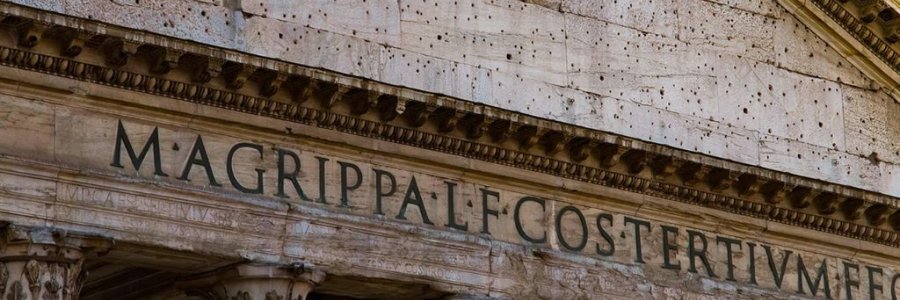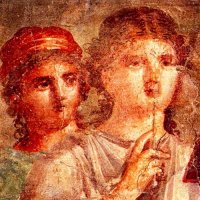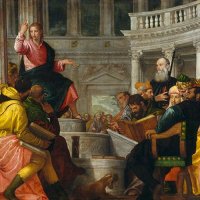
Postgraduate programmes UNINT
The Academy, in collaboration with the International University of Rome, organises two postgraduate programmes on:
- De arte latine in scholis docendi: inductive-contextual teaching of Latin.
- Geo-religious studies: methodologies, models and research.
Both postgraduate programmes are delivered remotely. At the end of the respective distance learning courses, there will be a week's stay in Frascati, at the headquarters of the Accademia Vivarium novum, in order to perfect the skills acquired and enrich the educational experience with an exceptional in situ experience.
Please note that, due to a diversity in denomination, what in Italy is called a 'Master' is the equivalent to a Postgraduate diploma (not an MA degree).
How to apply
https://altaformazione.unint.eu/wp-content/uploads/2025/11/Bando-Master-De-arte-latine_EN-2.pdf
Non-EU candidates who do not reside in Italy and hold an academic qualification equivalent to those mentioned above may submit their application via the Ministry of Education and Research portal, known as “Universitaly.”
In other cases, to apply for enrolment, students must:
- visit the University website (online secretariats) at https://my.unint.eu/sso;
- register;
- enrol in the master's program;
- print the MAV and proceed with the payment of the enrolment fee.
Further information on the online procedure can be found at: http://wikistudenti.unint.eu.
The application form can be:
- sent by email to: formazione@unint.eu, with the attachments duly scanned;
- sent by registered mail to UNINT- Scuola di alta formazione - via Carlo Conti Rossini - 38 Rome;
The application must be accompanied by the following documents: 1 passport photo and a copy of the paid MAV payment slip.
The deadline for application is February 28.
For more information, please write to: formazione@unint.eu
1. Postgraduate programme: Teaching Latin with the active method
 With decades of experience in the pedagogy of ancient languages, we often notice the challenges that teachers face in the search for effective ways to transmit their contents while eliciting long-term enthusiasm in their students. The Accademia Vivarium novum has therefore decided to join forces with the University of International Studies of Rome (UnINT) and offer a postgraduate degree in Latin pedagogy to students and teachers who already possess a minor degree in Classics and wish to teach through the active method either at high school or university level. The active method, which involves speaking and explaining texts of different historical periods directly in Latin, provides participants with a fully immersive training.
With decades of experience in the pedagogy of ancient languages, we often notice the challenges that teachers face in the search for effective ways to transmit their contents while eliciting long-term enthusiasm in their students. The Accademia Vivarium novum has therefore decided to join forces with the University of International Studies of Rome (UnINT) and offer a postgraduate degree in Latin pedagogy to students and teachers who already possess a minor degree in Classics and wish to teach through the active method either at high school or university level. The active method, which involves speaking and explaining texts of different historical periods directly in Latin, provides participants with a fully immersive training.
During the course, participants will be taught a variety of exercises and activities that help promote the application of Latin in the classroom. They will also be guided in the use of a wide range of Latin texts (from the ancient, medieval, Renaissance, and modern periods) pertaining to literary, historical, and scientific subjects, as well as epigraphical inscriptions and manuscripts. The practice of prose composition and other supplemental techniques will enable teachers to bring a well-rounded Latin education to the classroom.
The lessons will be conducted online, entirely in Latin, by highly experienced professors of diverse nationalities who are recognized worldwide as leading experts of Latin didactics. At the end of the distance learning course, there will be a week-long stay in Frascati, at the headquarters of the Accademia Vivarium novum, to perfect the skills acquired and enrich the educational journey with a unique on-site experience.
Learning outcomes:
- to use existing teaching tools for teaching Latin with an inductive-contextual approach;
- to design new teaching materials and personalised activities;
- to use Latin actively in teaching practice, both orally and in writing;
- to integrate historical and contemporary methods into the teaching of classical languages;
- to develop interdisciplinary courses involving philosophy, mathematics, science, art and history.
Click here to download the presentation of the course with full list of subjects and teachers.
| Timetable | |
|---|---|
| Regular lessons (remote) |
Every Tuesday and Thursday = 3 hours at a time (afternoon from 17:30 GMT+1) + 1/2 Saturdays per month = 2 hours at a time |
| Workshop (in person) |
1 week at the headquarters of the Accademia Vivarium novum (Frascati) From 6 to 11 July, 2026 |
| Final examinations (in person/remotely) | From 11 to 16 January, 2027 With the possibility of a second full immersion language experience and internship for those who choose to take the exams in person. |
Didattica delle lingue classiche
2. Postgraduate programme: Geo-religious studies: methodologies, models and research
 In a world in which political and cultural structures are constantly changing, it is essential to have a comparative understanding of the different civilisations that interact with each other, as well as the specific diachronic events that have led to the situations we see today. The religious factor is in any case decisive, as it has always influenced various cultural models and, in some areas, also coincides with political and legal aspects. The study of models from the classical, Jewish, Christian and Islamic worlds is essential for an adequate understanding of the phenomena of modernity.
In a world in which political and cultural structures are constantly changing, it is essential to have a comparative understanding of the different civilisations that interact with each other, as well as the specific diachronic events that have led to the situations we see today. The religious factor is in any case decisive, as it has always influenced various cultural models and, in some areas, also coincides with political and legal aspects. The study of models from the classical, Jewish, Christian and Islamic worlds is essential for an adequate understanding of the phenomena of modernity.
During the course, lecturers specialising in various disciplines will take turns presenting the fundamental texts of different religions, their doctrines, historical events, moments of conflict, confrontation and dialogue between religions as factors defining their identities and current relational dynamics.
The lectures will be held remotely and learners will be given the opportunity to ask questions, request further information and propose new ideas for reflection. The aim is to train professionals with adequate preparation in the fields of cultural mediation, academic research, teaching, essay writing, publishing, diplomatic and representative careers, and political engagement, especially if of international importance. Face-to-face seminars will allow for interaction between teachers and students and among students themselves.
Learning outcomes:
- understand and evaluate contemporary facts, events and situations more adequately in light of the historical processes studied;
- use language consistent with the aspects examined in the course of their studies;
- know and be able to use the main bibliographic tools to deepen knowledge or acquire new knowledge in relation to the multiplicity of topics studied;
- acquire a rigorous method of study and research in the fields of historical, historical-religious, social and philological-linguistic disciplines;
- increase the ability to transmit acquired skills and methods to a wider audience.
 English
English
 Italiano
Italiano
 Latina
Latina
